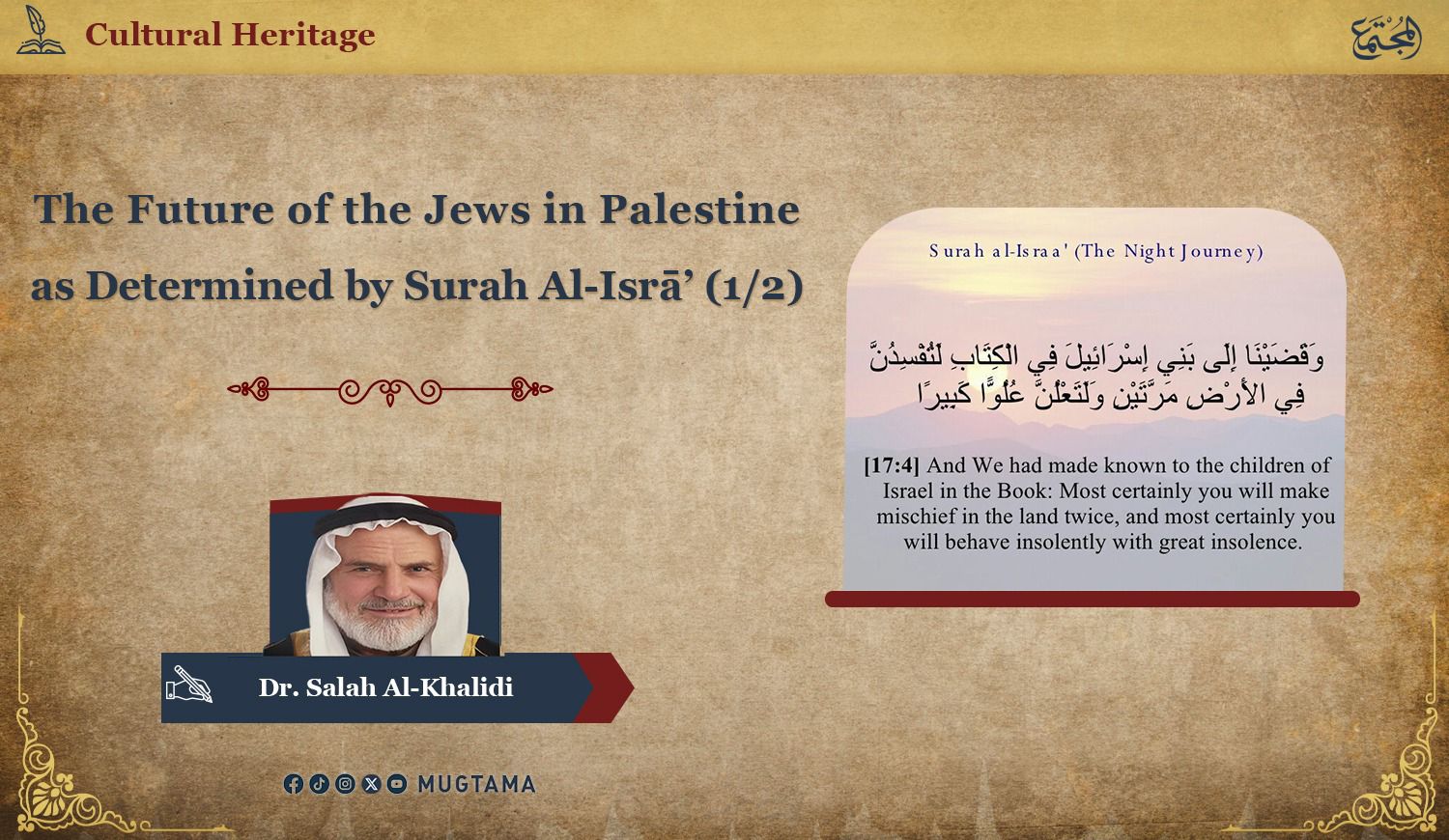The Future of the Jews in Palestine as Determined by Surah Al-Isrā’ (1/2)

A Struggle Between Two Messages
Allah, the
Exalted, says
] Glory to Him who
made His servant travel by night from the sacred place of worship to the
furthest place of worship, whose surroundings We have blessed, to show him some
of Our signs: He alone is the All Hearing, the All Seeing.(1) We also gave
Moses the Scripture and made it a guide for the Children of Israel. ‘Entrust
yourselves to no one but Me,(2) you descendants of those We carried with Noah:
he was truly a thankful servant.’[
Surah
Al-Isra has another divinely designated name: Bani Isra’il (the
Children of Israel). It begins with the account of the Night Journey of the
Prophet Muhammad (peace be upon him) from the Sacred Mosque in Makkah to Al-Aqsa Mosque in Jerusalem. It then highlights the blessings that God placed in
Al-Aqsa and its surroundings, before making a direct historical transition from
the Islamic message to the mission of Moses, the Prophet of Israel (peace be
upon him), and to the Torah with the duties that God had entrusted to the Bani
Isra’il (the Children of Israel).
It
informed us of two great acts of corruption, accompanied by great arrogance,
that would be committed by the Jews. It also revealed to us the condition of
the Jews in each of these instances, and it outlined the characteristics of the
devout servants of God who would put an end to these two corruptions. The surah
placed greater emphasis on the second act of Jewish corruption.
God
wants to make us aware of the true nature of our struggle with the Jews: it is
a struggle between two messages — the message of truth, represented by the
Muslims, and the message of falsehood, represented by the Jews. This struggle
begins in the city of Madinah and will conclude in the blessed land.
The
Manifestations of Blessing Around Al-Aqsa
Some
people may misunderstand the blessing surrounding Al-Aqsa Mosque, limiting it
only to agricultural prosperity, since it is a land that produces milk and
honey. While it is true that this form of blessing exists, it is but one among
many blessings and merely one manifestation of the numerous signs of blessing.
It is
blessed with a spiritual blessing, for faith has a deep-rooted, authentic, and
enduring presence there—both before Abraham (peace be upon him) and after him.
It is a land of prophethood and divine messages. Its blessing is spiritual,
ancient, contemporary, and future-oriented, for its authentic history is a
history of Islam, faith, and devotion to God.
It is
blessed with a blessing of struggle, civilization, and movement. Upon it, the
history of faith has recorded its critical turning points and great events, and
upon it, the history of ignorance has recorded its defeats, setbacks, and
demise. Its history is alive, active, and ever-moving, never stagnant. Its
years, months, and days bring astonishing surprises, momentous events, and
decisive battles, the downfall of states and regimes, and the birth of others.
Upon it, the Romans, the Persians, the Crusaders, and the Mongols were crushed;
upon it, God will crush the Jews and destroy their entity; upon it, God will
slay the deceitful messiah (al-Masīḥ al-Dajjāl); and upon
it, God will annihilate the hordes of Gog and Magog.
It is
blessed with a political blessing, for it is a land of trial and testing. It is
a land of exposure and disclosure — the land that unveils traitors, exposes
collaborators, and reveals the truth behind banners, slogans, and calls.
The Secret
Behind the Connection Between the Two Mosques
Surah
Al-Isra establishes a precise connection between the Sacred Mosque in
Makkah and Al-Aqsa Mosque. There lies a profound and subtle wisdom behind this
linkage, and among the reasons for this connection are:
1. Al-Aqsa Mosque and
its surroundings witnessed the presence of earlier divine messages, including
Judaism and Christianity. Their followers were the successors over the people,
the trustees of religion and faith, and the inheritors of the blessed land.
Meanwhile, the Sacred Mosque witnessed the beginning of the final, universal
message and the birth of the Islamic Ummah — the nation of succession,
inheritance, and trust. Since this new nation was established around the Sacred
Mosque, it must, in order to fulfill its role of succession and trust over
humanity, also take possession of what surrounds Al-Aqsa Mosque and inherit it
from those who dwell around it.
2. The surah calls upon
Muslims to view Al-Aqsa Mosque and its surroundings with the same reverence,
for it is blessed and sacred just as the Sacred Mosque and its surroundings are
blessed and sacred.
3. A warning to Muslims
against hostile conspiracies targeting the two mosques, and against the
ambitions of disbelieving enemies concerning them. The danger that threatens
Al-Aqsa Mosque is the very same danger that threatens the Sacred Mosque. When
the Crusaders seized Al-Aqsa and its surroundings and settled there, their
eyes, plans, and ambitions soon turned toward the Prophet’s Mosque in Madinah
and the Sacred Mosque in Makkah. Arnat, the Crusader ruler of Karak, launched
several attempts to invade the land of Hijaz — attempts that nearly succeeded,
had not God destined for this Ummah the leadership of Salah al-Din al-Ayyub
4. The surah brings glad
tidings from God to the oppressed Muslims in Makkah, who were then under
persecution and struggle. It promises them relief, victory, and empowerment.
That difficult phase they were enduring in Makkah would come to an end, and God
would grant them strength to conquer lands, reach the blessed mosque and the
sacred land, following in the footsteps of their Messenger (peace be upon him)
on the Night of Isra. They would open those lands, establish God’s rule upon
them, and rebuild and restore Al-Aqsa Mosque. The Prophet (peace be upon him)
thus served as a forerunner to the conquest of Greater Syria, and his Night
Journey to Al-Aqsa was a divine foreshadowing of the true future conquest of
this land by the Muslims.
The Two
Corruptions of Israelites
He, the Exalted, said:
] We declared to the Children of Israel in
the Scripture, ‘Twice you will spread corruption in the land and become highly
arrogant.’(4) When the first of these warnings was fulfilled, We sent against
you servants of Ours with great force, and they ravaged your homes. That
warning was fulfilled,(5) but then We allowed you to prevail
against your enemy. We increased your wealth and offspring and made you more
numerous––(6) whether you do good or evil it is to
your own souls––and when the second warning was fulfilled [We sent them] to
shame your faces and enter the place of worship as they did the first time, and
utterly destroy whatever fell into their power.(7) Your Lord may yet have mercy
on you, but if you do the same again, so shall We: We have made Hell a prison
for those who defy [Our warning]. [ ] Al-Isra[
And
Allah, the Most High, said at the end of the surah concerning the second
corruption:
] After his death, We told the Children of
Israel, ‘Live in the land, and when the promise of the Hereafter is fulfilled,
We shall bring you to the assembly of all people.’[ ]
Al-Isra:104 [
Scholars
have differed in their interpretation of the two acts of corruption, yet none
of the earlier explanations fully align with the events mentioned in the
verses. Therefore, it becomes necessary to reconsider the understanding of the
texts and the course of history. The Jews indeed rose to power in ancient times
and committed many acts of corruption; however, given the connection in the
noble verses between Al-Aqsa Mosque and Jewish history, we affirm that the two
acts of corruption are related to the Muslims after the mission of our Prophet Muhammad (peace be upon him).
Their First Corruption in Madinah:
The Jews came to Yathrib fleeing the Roman and Greek persecution poured upon
them in the Levant. The Arabs were impressed by the wealth, knowledge, and
culture the Jews possessed. The Jews, in turn, excelled in manipulating the
Arabs — spreading discord among them, draining their resources, and subjugating
them. They used to foretell the imminent coming of a prophet and warned the
Arabs that they would follow him and slay them alongside him. Yet when Muhammad
(peace be upon him) was sent, they turned out to be his fiercest enemies,
conspiring to kill him and fighting against him alongside the pagan Arab
tribes.
(When the first of these warnings was fulfilled …) — The word “idhā”
(when) refers to a future event, meaning that its fulfillment would occur after
the revelation of the Makkan verses of Al-Isra. Consequently, the devout
servants of God mentioned would also appear afterward.
(We sent against you…) — The use of the term “We sent” is deliberate
and significant. God raised the Companions from nothingness, for the Arabs in
the pre-Islamic era held no status or power. The word also conveys that the
coming of these devout servants was unexpected. Yet God brought forth the
Companions, and they eradicated the corruption of the Jews, inheriting not only
the limited power the Jews possessed in Madinah, but also the great powers of
Persia and Rome in the wider world.
(“Servants of Ours”) — This phrase applies only to the Companions, for God Himself called them
“servants” and attributed them to Himself with the phrase “of Ours.”
The term ‘ibād (servants) cannot apply to the disbelievers of old, such
as Nebuchadnezzar and others whom historians claim were the ones to eradicate
the two corruptions. There is a clear distinction in the Qur’an between the
words ‘ibād and ‘abīd, for there are no exact synonyms in the
Qur’anic vocabulary.
The
word ‘abīd (slaves) appears five times in the Qur’an, always in
reference to disbelievers, most often in the expression: “And your Lord is never unjust to the
slaves” (Fussilat:
46) — meaning that God
judges the disbelievers with perfect justice.
By
contrast, the word ‘ibād (servants) is mentioned ninety-five times, more
than ninety of which refer to the believers. The elongated vowel ā in ‘ibād
conveys honor and dignity — qualities that belong to the Muslim.
(“Men of great
might”) —
The strength and might of the Companions in confronting the Jews manifested in
two dimensions:
- The material aspect: their fierce combat against the Jews, evidenced
by their siege of Banu Qaynuqa‘, Banu Nadir, the execution of Banu
Qurayza, their battles at Khaybar, and ultimately expelling the Jews from
it.
- The moral aspect: their defiance of the Jews and their
humiliation of them, witnessed in the stances of Abu Bakr, Umar, Ali,
Ubadah ibn al-Samit, Abdullah ibn Rawahah, and others.
______________________________________
You
may like also:
· Book Review (Our story with the Jews) (1/2)
· The Final Struggle for Al-Aqsa: Has It Begun?











